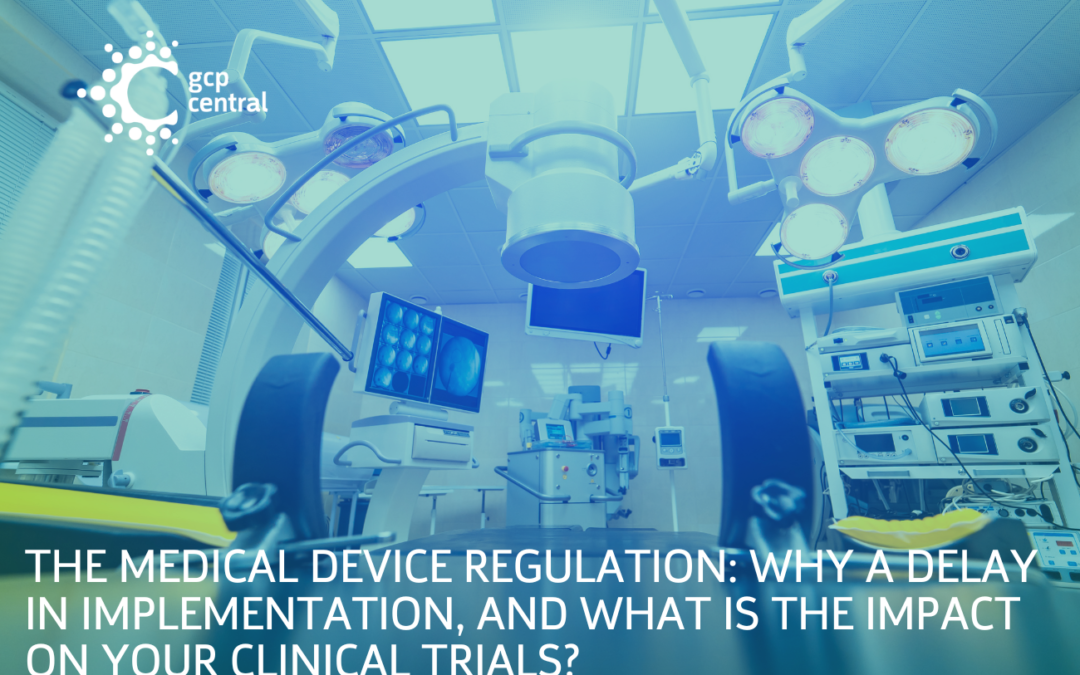With the European Commission adopting a longer transition time to adapt to the Medical Device Regulation (MDR), important questions to pose are why this delay and how does it impact your clinical research-related work?
GCP Central spoke with our resident MDR expert, Esther Daemen, on the subject.
Esther, can you tell us more about the Commission’s decision?
This is a verbatim quote from the 6 Jan, 2023 Commision’s publication (COM(2023) 10final / 2023/0005 (COD): “Despite considerable progress over the past years, the overall capacity of conformity assessment (‘notified’) bodies remains insufficient to carry out the tasks required of them. At present, 36 notified bodies are designated under Regulation (EU) 2017/745. Further 26 applications for designation as notified body are currently being processed; three of them are at an advanced stage. Notified bodies available today estimate that the transition of all Directives’ certificates to MDR certificates could possibly be completed by December 2027”.
Therefore, the Commission’s decision to delay is imperative under the circumstances to avoid temporary shortages of potentially life-saving medical devices on the market due to a lack of MDR-compliant CE marking of these devices.
Had the delay only to do with the notified Bodies’ workload?
No, this is not the only contributing factor. Unfortunately, next to Notified Bodies, many manufacturers are still not sufficiently prepared to meet the robust requirements of the Medical Devices Regulation by the end of the initial transition period.
Most have genuine resource issues. However, there are also many cases of submitting incomplete compliance assessments for review and approval, which lead to increased workload for the Notified Body and thus further delays, or they procrastinate the setting of compliance strategies and related activities until the last moment, creating non-compliances and Notified Body review bottlenecks. Some of these latter groups are even silently hoping for further extensions of the timelines, which is to be considered as non-compliant behaviour. .
Will this extension provide sufficient time for compliance?
Yes, it should, providing further timely guidance from the MDCG on what timelines apply for which device since it is set in a risk-based and generic fashion, with no further procrastination by legal manufacturers and no unforeseen delays in reviews and approval by Notified Bodies. Legal manufacturers must act now to be on time and follow additional guidance from the MDCG for clarity on timelines and expectations for their specific devices. An early adaptation to MDR also has many business advantages because no significant changes may be made with MDD-certified ‘legacy’ devices (with the exception for changes related to incidents or complaints). This negatively impacts innovation, business objectives and pipelines for the future.
What steps should those involved in medical device research prioritize in light of the delays?
This delay in the timeline for MDR compliance does not impact your work as a clinical researcher on the execution of a clinical trial. The MDR should be followed since its effective date (26 May 2021) for all clinical trial-related requirements. This delay has not affected the timeline for the EUDAMED going live for trial-related submissions and related communications.
For an overview of the EUDAMED launch timeline, visit this link. GCP Central’s MDR training course provides more information about the timelines for Dutch and European medical device trials.
Clinical Researchers, however, could be positively impacted by getting more time to complete their planned and ongoing MDR-compliant trials to deliver clinical data. This is required for the clinical evaluations, which is a crucial part of the MDR CE-mark submission requests. This extra time is even more beneficial for clinical researchers who experience an increased workload due to the higher need for clinical trials for data collected. This could definitely be the case when working with Class III and implant devices. The clinical data related to these should be collected under the MDR through a clinical trial instead of other means like literature research.
However, as for the manufacturers, this extra time should not lead to procrastination or unnecessary extension of timelines for trial completion. Instead, it should lead to more efficiencies, a buffer for unexpected situations and room for more necessary clinical data collection as needed.
We would like to thank Esther Daemen for her time, valuable insights into the changes to the MDR timeline, and expertise in developing our MDR training for Clinical Research.
GCP Central offers training in the new Medical Device Regulation for research within the Netherlands and Europe. Stay current with the changes in this regulation, and be compliant and trials ready with our online training designed with busy research professionals in mind.
Further Information:
Public health: more time to certify medical devices to mitigate risks of shortages: Statement from the European Commission, 6 January 2023
Purchase your training via these links.




